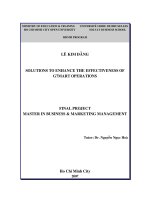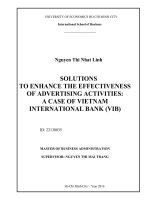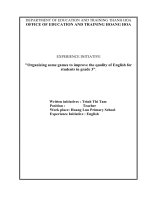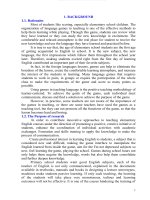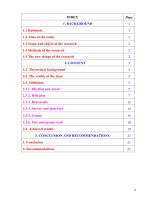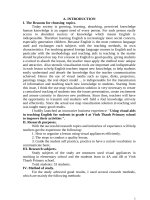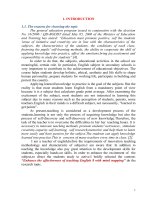Some group activities to enhance the effectiveness of teaching english for students in grade 4
Bạn đang xem bản rút gọn của tài liệu. Xem và tải ngay bản đầy đủ của tài liệu tại đây (2.3 MB, 16 trang )
THANH HOA EDUCATION & TRAINING
DEPARTMENT
THANH HOA CITY EDUCATION & TRAINING OFFICE
EXPERIENCE INITIATIVE
SOME GROUP ACTIVITIES TO ENHANCE THE
EFFECTIVENESS OF TEACHING ENGLISH FOR
STUDENTS IN GRADE 4
The implementer : Nguyen Thi Lan
Position
: English Teacher
School
: Ba Dinh primary school
Subject
: English
THANH HOA 2021
1. INTRODUCTION
1.1. Reasons for choosing the topic
For the recent years, English has become an international means of
communication which has been used everywhere and in every field. Having
recognized the importance of English in life, schools and families have
increasingly devoted special attention to this subject. For some past years, at
many primary schools, English has been chosen as an elective subject with the
duration of 2 to 4 periods per week.
Previously, under the old teaching method, teachers play the central role
in conveying knowledge, whereas students only receive the knowledge
passively. This method is not only little effective but also not suitable for the
present development situation of our country. Requirements for the innovation
of teaching methods that promote learners’ activeness are that students must
present their own self-discipline and creativity in order to master and dominate
the knowledge. For teachers, the exploration and application of new methods is
a frequent requirement set out in teaching process.
The group activity is an essential requirement in methodological
innovation in school education today. Each teacher has different ways of
organizing the class, depending on the purpose, requirements and knowledge
which need conveying in each different lesson. However, to achieve the true
quality of the group work in which all students in the class can actually work,
avoid depending on and waiting for the other students is not absolutely simply.
In the school year of 2013 - 2014, being assigned to teach English in the Grade 4
at Ba Dinh primary school, with such thoughts and concerns, I have tried on
applying some group activities to enhance the effectiveness of English teaching
for students in grade 4 and achieved certain positive results.
1.2. The purpose of research
The purpose of my research is to find the best ways of teaching students in
grade 4 who follow the English program of ten years to learn actively and
effectively.
1.3. The subject of research
I have applied alternately to the lessons in English textbook grade 4 and
have performed for students in classes 4A6, 4A7 at Ba Dinh Primary school.
1.4. The methods of research
In order to implement this initiative, I have chosen some of the following methods:
- Reading documents that relate to the research issue.
2
2
- Survey method for comments.
- Testing method.
- Pedagogical observation method.
- Method of assessment.
1.5. The new points of the research
With certain achievements in the iniative of the school year 2013- 2014
for students in grade 4, I have continued to use and adjust key points in the
initiative as well as developed more new points for students in grade 4 in the
school year 2020- 2021. I have added one more group activity in order to vary
the solutions in this initiative (see 2.3.6)
2. CONTENT
2.1. Rationale
The group activity, a teaching activity has been applied in the training of
students with the aim of helping students learn actively as well as reduce the
habit of learning passively. The current reformed English teaching program has
focused on developing communication skills for students; in the other words,
Listening and Speaking skills are put in the first place of the concern. After
many years of teaching English in accordance with the new method, I myself
have drawn experiences that the group activity can help enhance the
communication, exchange and cooperation among students. Organizing the
group activity in English teaching periods will help students be dynamic,
positive, attract the their attention and save time and as well as facilitate
teacher's work as a guider or advisor.
English 4 textbook is designed according to four themes: Me and my
friends, Me and my school, Me and my family, Me and the world around. Each
theme consists of five units with three lessons.
Thanks to the process of researching the structure of English 4 textbook,
the teaching process as well as the practical test in grade 4 at Ba Dinh primary
school, Thanh Hoa City or the training courses held by Thanh Hoa Department
of Education and Training, I myself have drawn some group activities consistent
with the content of English 4 textbook.
2.2. The situation of the problem
Through practical observation, estimates for the colleagues’ teaching
periods I have realized there is a current situation that while teaching English at
the primary schools, some teachers have not paid enough attention to the group
3
3
activities in the class or some teachers, despite focusing on group activities, have
not had various ones to attract their students. The following is the first term
result of the quality of students in classes 4A6, 4A7 at Ba Dinh primary school
in the school year of 2020- 2021:
Total
number
Classes
of
student
s
4A6
39
4A7
39
Excellent students
Quantit
y
18
20
Percentag
e
(%)
46
51
Good students
Fair students
Quantit
y
%
Quantit
y
%
19
18
49
46
2
1
5
3
This result is not really as good as I expected, which has motivated me to
think and find new activities so as to attract students’ attention and interest to the
subject. In my opinion, teachers of English need to base on the actual
characteristics as well as students’ ability, the content of the knowledge to design
the appropriate group activities so that the group performance has actually
achieved teaching purposes. From the current situation, in the process of
teaching English for students in grade 4, I have concerned and thought carefully
to apply some group activities that I consider to be quite consistent with the
structure of the program.
2.3. The solution to the problem
English 4 textbook is designed in the direction of innovation with the
topic quite close to students such as: “Me and my family”, “Me and the world
around”... Depending on the content of each lesson and each activity, teachers
can design appropriate group activities. Below I outlined several group activities
applicable to the parts in a number of lessons:
2.3.1 “Answers’ prediction” group activity
This activity can be applied to such parts: “Listen and tick”, “Listen and
number”. The purpose of this activity is encouraging students to discuss in
English in groups on paintings given so that they can practise the learnt
vocabulary, sentence patterns to predict the correct pictures or the correct order
of appearance of the pictures. After predicting, students will have a certain
number of words associated with each picture so that while listening, they will
4
4
focuse on listening to the key words as well as make them more interested in
listening activity. Here are a specific example:
Part 2: “Listen and number”, Lesson 2, unit 16 “Zoo animals”, page 44,
English 4:
For this part, before listening, the teacher divides the class into groups of
4 members to discuss the animals in the pictures towards answering the
question: “What animal is it?”, “What does it look like?”, “What is it doing?”.
After answering, students have had some words or phrases related to the pictures
such as: “bear”, “bulky”, “honey”... Each group will write the prediction of their
own correct picture order. When listening, students will focus on the key words
and be eager to know if the correct answer would be the same with their
prediction. The winner group will get a small present and good comment from
the teacher or other students in the class.
2.3.2 “Braining storming” group work
This group activity can be applied to the “Listen and repeat” part when
the teacher expect to set the scene for the content of the conversation by asking
students to work in group and discuss on its picture. This activy can motivate
5
5
students’ ability of brainstorming, observing, precdicting and especially, students
can brainstorm the vocabularies that will probably appear in the coversation.
Here is a specific example:
Part 1: “Listen and repeat”, Lesson 3, Unit 17: “My area”, page 52,
English 4:
For this part, before teaching the conversation, the teacher devides the class
into groups of 6 to 8, and asks the groups to look at the picture carefully and list
all the words or sentence patterns that would be possibly related to the
conversation between Mai and Nam.
Nam & Mai
post office
zoo
Let’s go to the zoo
6
6
After 5 to 7 minutes, the teacher collects the result of groups. The group
which brainstorms the most correct related words or sentence patterns will be
the winner.
2.3.3.“Words and phrases pairs” group work
This activity is very suitable with “Look and say" part because it helps
students remember the words and phrases that have just been learnt as well as
find the words and phrases pairs which will go with each other in a sentence
pattern. When practising, they would no longer use the wrong ones. Here is a
specific example:
Part 2: “Look and say”, Lesson 3, Unit 15 “Festivals”, page 34,
English 4:
For this part, before executing the practice, the teacher devides the class
into groups of 8 and prepares 8 cards in which the festivals’ name are written on
4 cards and the activities for festivals are written on four other ones for each
group. In each group, 4 students keeping the cards with the name of the festivals
7
7
will be asked to read the names of festivals by the group leader. When a card is
shown, the student with the card in which there is the phrase of the
corresponding activity will show his/ her card for the whole group to read aloud.
The group finishing the task the most correctly and fastest will be the winner.
2.3.4. “Letter, sound, word” group work
This activity is quite suitable for teaching pronunciation. Especially, at
Ba Dinh primary school, students in the grade 1, 2 are those who are taught
Phonics English program. Thus, this will be very close to them and enable them
to distinguish the sound and the letter easily (the sound is how to pronounce and
the letter is how to write) because some English sounds have a variety of the
ways to pronounce. For instance, the letter “e” in the words “pen”, “women”,
“be”... is pronounced in quite different ways. Here is a specific example:
Part 1: “Listen and repeat”, Lesson 2, Unit 11: “My daily activities”
page 8, English 4:
8
8
For this part, after teaching the sounds /i:/ và /i/ in the words: “fift een”
and “fifty”, the teacher may help students to practice and remember with a
group activity as follows: The class is devided into groups of 10 in which a
student is chosen to be the group leader, 9 other students will chosen into 3
smaller groups: “letter”, “sound”, “word” at random. When the group leader
points at any word and says “letter”, the “letter” group will stand up and say
aloud the underlined letter(s) quickly. If the group leader says “sound”, the
“sound” group will stand up and say aloud the sound of underlined letter(s). If
the group leader says “word”, the “word” group will stand up and say aloud the
word which has the underlined letter(s) The smaller group in each group does
the task the most perfectly will be the winner and come to the board to perform
their task.
2.3.5. “Pictures/ Words matching” group work.
This acctivity is comparatively suitable for "Talk" part because there
are no words or phrases given in this part, which may make students confused.
Before practising this part, if the teacher organize this type of group work,
9
9
students will be helped to recall learnt words and phrases. Here is a specific
example:
Part 3: “Talk”, Lesson 1, Unit 13: “My favourite food and drink”, page
19, English 4:
For this part, before asking students to practice in pairs, the teacher asks
them to work in groups of 4. Each group is given a card in which there is the
picture of the food and drinks and their corresponding words. In the given time
of 3 to 5 minutes, the groups will match the pictures with the correct words as
quickly as possible. The group finishing the task the most quickly and correctly
will be the winner.
2.3.6. “Written Storytelling” group work
Divide the class into small groups. Each group gets to choose three
random words from a bag and must incorporate each word into a short story.
Depending on your students’ levels of English acquisition, you can assign
10
10
specific numbers of characters, amount of dialogue, length, etc. to be included in
the story.
At the end of the lesson, groups can take turns reading stories aloud. For
increased participation and extra practice with speaking, you can ask the
students who are listening to the story to comment on their classmates’ work.
For beginning students, sentence starters like, “I liked….” or “what did you
mean by…?” can be helpful to encourage feedback.
Both the written storytelling and the small group discussion that follows
are valuable practice time. Together, they’ll help students practice written and
spoken English in one swoop. As in the oral storytelling suggestion above,
assign topics that require students to discuss American customs or cultural
norms, like privacy, personal space, hygiene or dining. This adds an additional
challenge for more advanced students and gets all students to improve their
cultural literacy.
This activity is comparatively difficult for students in grade 4 and is often
applied in “Short Story” in Review after 5 units. Here is one example:
11
11
2.4. The practical test
During the English teaching years at Ba Dinh primary school, I have
applied, improved the familiar group activities as well as created, tested the new
ones. Resultedly, the effectiveness English teaching for my students has been
apparently improved. The group activities in the class are logically organized to
12
12
attract the help and participation of all the students, therefore, each group
activity is quite attractive and practically effective. After a period of learning
English, students are more excited about learning the language. At the end of the
second term of the school year of 2020- 2021, in classes of grade 4 I am
teaching English, the number of good and excellent students has ranked over
90%. This number has increased in comparision with the one of the first term in
the same school year. The specific result is shown in the following data table:
Total
number
Classes
of
student
s
4A6
39
4A7
39
Excellent students
Quantit
y
20
22
Percentag
e
(%)
51
56
Good students
Fair students
Quantit
y
%
Quantit
y
%
18
17
46
44
1
0
3
0
In addition, the group result is given according to the students’ monthly
marks with comparatively good quality. In my point of view, when the group
activities are held logically and suitably, students will be more active and
interested in the subject. Especially, the group activity will help to attract the
participation of all the students. Morevover, good and excellent students will
have the chance of helping fair ones.
3. THE CONCLUSION AND RECOMMENDATIONS
3.1. The conclusion
It goes without saying that group activities have plus sides. By taking part
in group activities, students have opportunities of listening, showing their ideas,
discussing, cooperating with other students. Furthermore, the communication
skills, the ablity of brainstorming, dealing with a problem or being independent
and self- confident have been considerably improved. As a result, learners are
more active in getting the knowledge.
In group activities, students are put in the small group in which they will
discuss and work together to deal with a given task. This can motivate the
cooperation and help among all the members in the group and require all of
them to work in a strict and effective way.
For all these above reasons, the group activities should be applied
13
13
regularly in English teaching periods. Each teacher of English should spend
more time and concern in using as well as discovering suitable group activities.
3.2. The recommendations
Teaching English by using group activities is not a new theme. However,
from my own experiences in the process of teaching English to students in grade
4 under the new program with a duration of 4 periods per week, I hope some
group activities that I have adopted and tested in this theme will help colleagues,
especially colleagues teaching English at primary schools collect some more
group activities to diverse their own ones.
With the positive and satisfactory results I have obtained, personally, I
would like to propose to the Staff of Administrators at Ba Dinh primary school
to facilitate the school-wide application.
However, this is an initiative by my personal experiences drawn from
practical teaching, thus, it would not be surely avoid deficiencies. I personally
expect the interest and comments from the leaders and colleagues.
HEADMASTER’S SIGNATURE
I swear this thesis is written by me
without copying content from others.
Thanh Hoa, March 12th , 2021
Written by
Nguyen Thi Lan
14
14
REFERENCES
1. Teacher’s English 4 textbook - Vietnamese Education Publisher
2. Exercise games for English exams - Tran Ba Son - Pedagogical University
Publisher
3. Materials for English teaching methods- Pedagogical University
Publisher.
4. Articles about group activities from the website: http:// google.
com.vn.
15
15
INDEX
1
2
3
4
5
6
7
8
9
10
11
12
13
14
15
16
17
18
19
20
1. INTRODUCTION
1.1. Reasons for choosing the topic
1.2. The purpose of research
1.3. The subject of research
1.4. The methods of research
1.5. The new points of research
2. CONTENT
2.1. Rationale
2.2. The situation of the problem
2.3. The solutions implemented
2.3.1. “Answers’ prediction” group activity
2.3.2. “Brainstorming” group work
2.3.3. “Words and phrases pairs” group work
2.3.4. “Letter, sound, word”group work
2.3.5. “Pictures/ Words matching”group work
2.3.6. “Written Storytelling” group work
3. THE CONCLUSION AND RECOMMENDATIONS
3.1. The conclusion
3.2. The recommendations
REFERENCES
16
1
1
1
1
1
1
2
2
3
3
4
6
7
8
9
10
11
11
11
12
16
